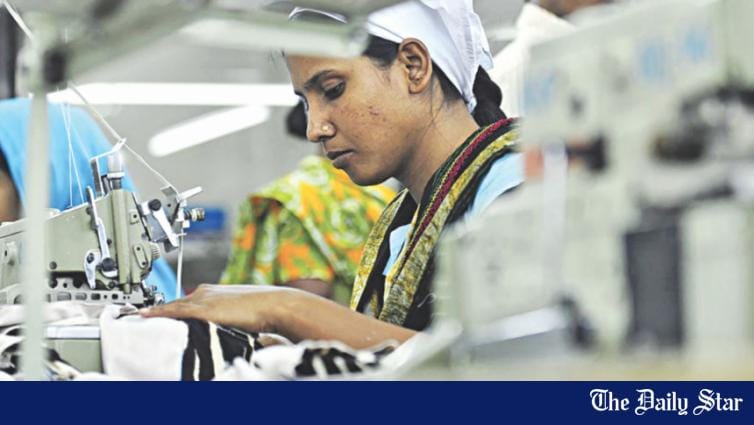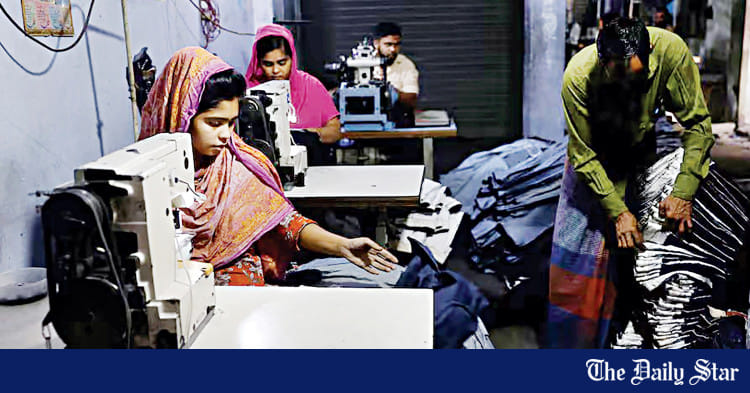Saif
Senior Member
- Messages
- 15,397
- Nation

- Axis Group


All sides for 9% raise in minimum garment wage
A state-run annual increment and wage review committee yesterday recommended that the government raise the minimum wage of garment workers by 9 percent.
All sides for 9% raise in minimum garment wage

photo: Star/file
A state-run annual increment and wage review committee yesterday recommended that the government raise the minimum wage of garment workers by 9 percent.
The workers had been seeking 10 percent to address yearly inflation in the country while staging demonstrations in August and September over an 18-point demand.
However, the garment factory owners offered 8 percent during recent tripartite meetings organised by the Ministry of Labour and Employment.
One such meeting yesterday settled on 9 percent, according to an agreement signed by the committee's Chairman Md Sabur Hossain alongside representatives of the workers and factory owners.
The labour ministry will now have to finalise the rate and issue a circular to bring it into effect.
A tripartite meeting yesterday settled on a 9 percent increase to the minimum wage for garment workers, according to an agreement signed by Md Sabur Hossain, increment and wage review committee chairman, as well as workers' representatives and factory owners
This will enable workers to receive revised salaries based on the increment from January next year.
Other benefits will also take into account the annual increment as per the Labour Law (amended) of 2006, the agreement said.
In previous years, the increment was fixed at 5 percent.
Over 99 percent of factories under the Bangladesh Garment Manufacturers and Exporters Association (BGMEA) have implemented the previous minimum wage, as promised by the factory owners, according to a report from the Ministry of Labour and Employment.
In late November last year, the minimum wage board finalised Tk 12,500 as the minimum monthly salary for garment workers.
According to the report, at least 2,121 factories out of 2,140 had implemented the minimum wage by October this year, with the remaining 19 yet to comply.
photo: Star/file
A state-run annual increment and wage review committee yesterday recommended that the government raise the minimum wage of garment workers by 9 percent.
The workers had been seeking 10 percent to address yearly inflation in the country while staging demonstrations in August and September over an 18-point demand.
However, the garment factory owners offered 8 percent during recent tripartite meetings organised by the Ministry of Labour and Employment.
One such meeting yesterday settled on 9 percent, according to an agreement signed by the committee's Chairman Md Sabur Hossain alongside representatives of the workers and factory owners.
The labour ministry will now have to finalise the rate and issue a circular to bring it into effect.
A tripartite meeting yesterday settled on a 9 percent increase to the minimum wage for garment workers, according to an agreement signed by Md Sabur Hossain, increment and wage review committee chairman, as well as workers' representatives and factory owners
This will enable workers to receive revised salaries based on the increment from January next year.
Other benefits will also take into account the annual increment as per the Labour Law (amended) of 2006, the agreement said.
In previous years, the increment was fixed at 5 percent.
Over 99 percent of factories under the Bangladesh Garment Manufacturers and Exporters Association (BGMEA) have implemented the previous minimum wage, as promised by the factory owners, according to a report from the Ministry of Labour and Employment.
In late November last year, the minimum wage board finalised Tk 12,500 as the minimum monthly salary for garment workers.
According to the report, at least 2,121 factories out of 2,140 had implemented the minimum wage by October this year, with the remaining 19 yet to comply.





